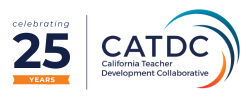Q & A with CATDC facilitator Stella Beale

Stella Beale has participated in CATDC workshops since 2007, and presently co-facilitates our Department Chairs Program in Los Angeles. We share her experience to show our gratitude for her continued engagement, and growing passion for professional development.
When did you first get involved with the CATDC?
I am pretty sure my first experience with the CATDC (then BATDC) was back in 2007; I had just moved out to San Francisco from Ann Arbor, Michigan, and I was teaching English full time at San Francisco University High School. After receiving an e-blast from Janet McGarvey, a couple of colleagues and I signed up for a one-day workshop on facilitating discussion with Kate Moore. That workshop was all it took. I have been something of a CATDC junkie since then. I thoroughly enjoyed the workshop, but—more than that—I was energized by the opportunity to confer with colleagues from a host of different area schools about some of the challenges I was facing as a teacher. This, I think, is the magic of CATDC. The programs are tremendous and the facilitators high skilled, but it is the opportunity to learn from my peers and to network in truly meaningful ways that keeps me coming back.
How have your views changed on what it means to be a leader?
My philosophies of education and leadership are evolving entities. My understandings and beliefs have been and will continue to be formed and re-formed by my experiences, readings, and by my ongoing efforts to ask and answer a set of critical questions including, but not limited to, the following: How might we best put learning and students at the center of all that we do? How might we more effectively communicate with one another? How might we best approach the tension between the individual and the community that is so prominent in independent schools? And how can we best honor the past while positioning our students and ourselves for the future? These questions and questioning in general are essential. My experience and mentors have taught me that leadership is a lot less about having the answers than, perhaps, I thought it was in the early days of my career.
Even as my understandings of what it means to be a leader evolve, I do find myself returning to a few fundamental truths. One such was offered by John Dewey when he exhorted schools and their leaders “to make ceaseless and intelligently organized effort[s] to develop above all else the will for co-operation and the spirit which sees in every other individual one who has an equal right to share in the cultural and material fruits of collective human invention, industry, skill and knowledge” (Dewey, 1974, p. 13). The question of how to make his vision a reality is one that I hope never to cease asking, and one that has drawn me inexorably toward leadership. Leadership is becoming. Becoming a model, a mentor, a servant, a follower, an inspirer, a storyteller, a manager, a course-charter, a vision-setter, and, ultimately, one’s own true self. “To keep at it” is my aim (Dewey, 1914, p. 428).
What do you like most about your job?
My job is incredibly varied. I work with students, faculty, and parents, and this is part of what makes it so very rewarding. In any given day I spend time thinking and brainstorming about big-picture, whole-school issues and trouble-shooting individual problems. It is such a privilege and an honor to have the opportunity to contribute to the lives of my students, their parents, my colleagues and to the life of the school. When I moved into the world of independent school teaching and first began to try on different leadership roles, I began to comprehend the ways in which, at their best, schools can exert a profoundly positive influence on the individuals (both adults and children) who inhabit them. I couldn’t be happier to have a place in the world of education and to have the opportunity to work in partnership with others to make a difference.
What professional development books do you recommend?
- Trust Matters, by Megan Tschannen-Moran
- Thanks for the Feedback, by Douglas Stone & Shelia Heen
- The Art of Coaching Teams, by Elena Aguilar
- Creating Cultures of Thinking, by Ron Richhart
 Stella Beale: Stella Beale began her career in education twenty years ago teaching English in the public schools in North Carolina. For the past three years, she has worked as Associate Director of Upper School at Windward in Los Angeles, California. As Associate Director, Stella has many disparate duties and responsibilities, but those that most interest her concern supporting faculty in creating curriculum and becoming more effective teachers.
Stella Beale: Stella Beale began her career in education twenty years ago teaching English in the public schools in North Carolina. For the past three years, she has worked as Associate Director of Upper School at Windward in Los Angeles, California. As Associate Director, Stella has many disparate duties and responsibilities, but those that most interest her concern supporting faculty in creating curriculum and becoming more effective teachers.
